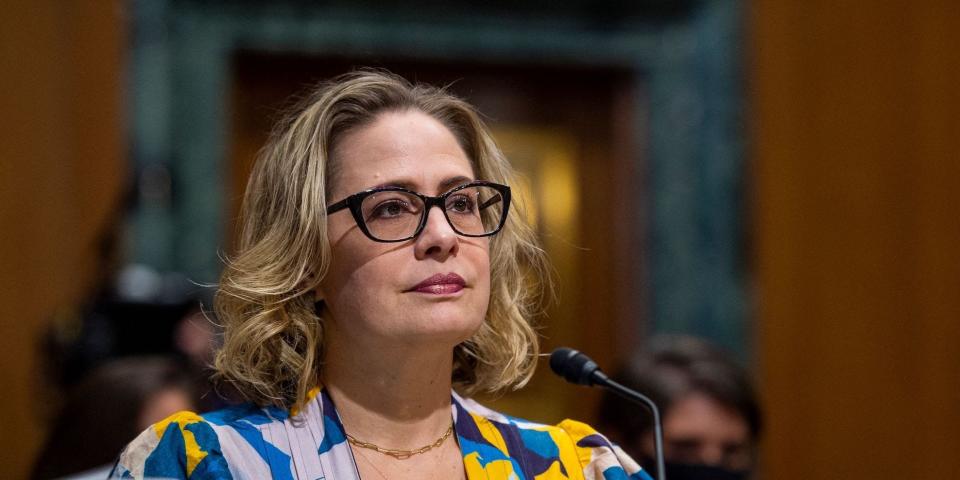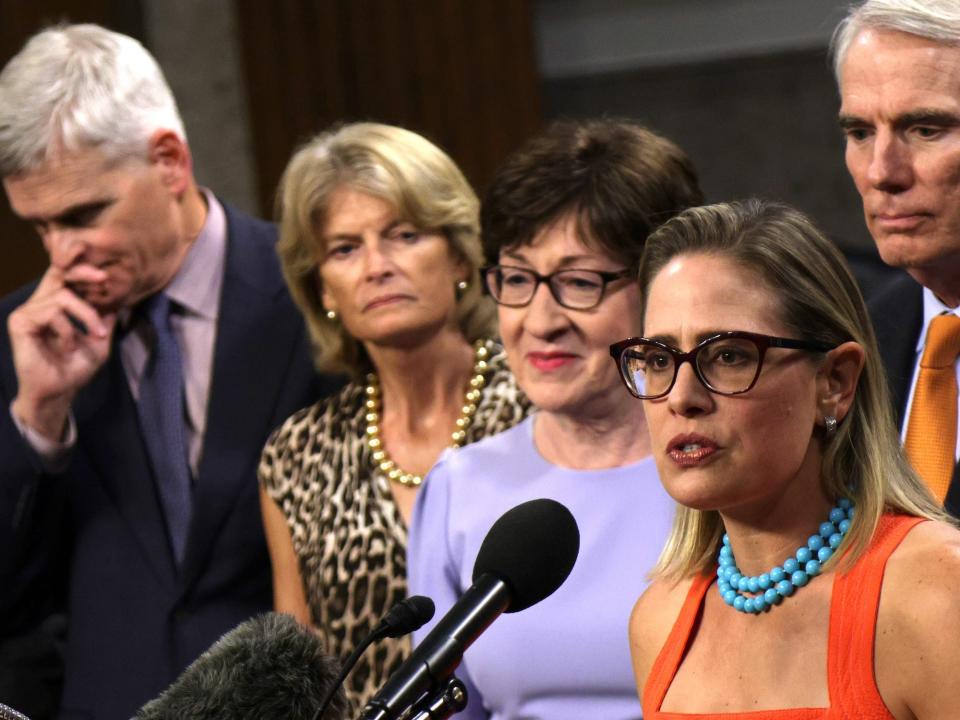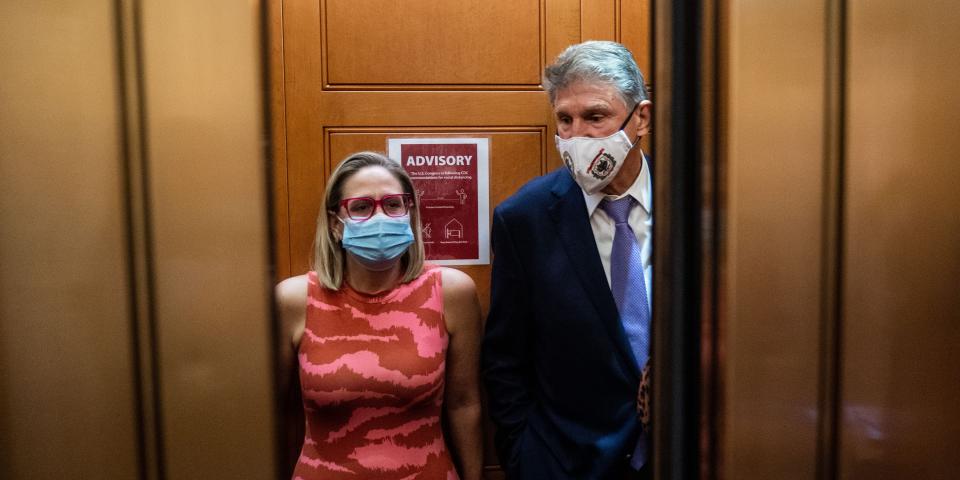Inside Sen. Kyrsten Sinema's long, messy breakup with Arizona Democrats

The relationship between Sen. Kyrsten Sinema and Arizona Democrats has completely broken down.
The Arizona Democratic Party is furious at her support for the Senate filibuster.
But their disagreements stretch much farther back, to Sinema's days as a congresswoman.
For three years, Sen. Kyrsten Sinema had been elusive. Local Democrats had marshaled their forces and cash to help elect her to the Senate. But after that, state party officials told Insider, Sinema has rarely engaged with them, declining to hold large public town halls or meetings with state party figures and leaving key Democrats confused by her stance on major issues.
Then on June 23, 2021, they caught their white whale: they'd gotten a meeting with Sinema, just as they were approaching their breaking point.
When the Arizona Democratic Party formally censured Sinema last week, it was not a sudden fit of pique, but the conclusion of a long-deteriorating relationship between Arizona's senior senator and her state's party machine. Insider spoke with seven members of the Arizona Democratic Party about their organization's frustration with Sinema, which had been building since her election to the Senate in 2018.
The senator's blockage of President Joe Biden's key legislative proposals, coupled with what local Democrats view as her inaccessibility in the state, has led to a breakdown with little chance of healing. Should the schism persist, it could affect Sinema's ability to run a successful re-election campaign in 2024.
"Her support among the party members has collapsed," Michael Slugocki, a vice-chairperson of the Arizona Democratic Party, told Insider. "People are frankly done with her."
Much of the outrage directed at Sinema now was fomented back on that June call. Furious at her support for keeping the Senate filibuster, which party members saw as a blockade to voting rights legislation, equality measures, and other key elements of the Democratic agenda, they wanted to press Sinema on her rationale for the vote and urge her to change her position. Despite their differences with the senator, they hoped for a productive dialogue.
What happened instead, as board member Brianna Westbrook told Insider, was "one of the most …one-sided Zoom calls I've ever participated in."
Sinema kept her camera off for the duration of the Zoom call, according to Westbrook.
In a recording of the meeting obtained by Insider, Sinema can be heard reading an eight-minute statement in response to pre-submitted questions from the executive board.
"I understand the frustration about the lack of bipartisan cooperation, and I often share it because I was elected to get things done for Arizona," Sinema said. "But as you know, I believe that all or nothing political battles leave us with nothing, and they don't help us achieve lasting results."
Westbrook asked Sinema to commit to "holding three town halls by the end of October." Sinema declined to commit, telling Westbrook and the board to follow up with a staffer overseeing her schedule.
"I am out in the state all the time, working with folks, listening to folks, and ensuring that I and my team are hearing from constituents throughout the state," Sinema said. "And that of course is something that obviously I remain committed to."
The board members asked three questions before Sinema had to leave.
The call only lasted 17 minutes, but the damage was done.
Six months later, Sinema enraged members of her own party by voting with Senate Republicans to keep the filibuster intact, thereby ensuring the failure of two pieces of voting rights legislation that were top priorities for Democrats.
Sinema's office pushed back on criticism that she had not been accessible in the state and provided Insider with a lengthy list of local interviews, tele-town halls, and in-person events she had held over the past year.
"Arizona input and values fuel Senator Sinema's work and she consistently meets with and hears from folks across the state, including in recent weeks when she has held numerous in-person and virtual meetings and calls with Arizonans of all backgrounds – from student groups to civil rights leaders –on a variety of issues," a Sinema spokesperson Hannah Hurley said in a statement to Insider.
But her critics say they're moving on from her and that she may find herself struggling to find campaign staffers and volunteers when she comes up for reelection.
"She hasn't considered who's gonna knock on doors for her, who's gonna phone bank for her," Slugocki said. "I can't think of a person who's gonna phone bank for her or door knock for her in 2024. Everyone who got her into office in 2018 is done with her."

'She was the AOC of Arizona'
Democrats who knew Sinema back in the day have a hard time squaring the onetime Green Party activist who championed LGBTQ rights and fought against Republican-backed immigration laws with the senator who they believe now votes against her party's interests.
Sinema started out as a member of the Arizona Green Party, working on Ralph Nader's 2000 presidential campaign. She once protested outside a 2003 campaign event for then-Connecticut Sen. Joe Lieberman in Tucson, calling him "a shame to Democrats," according to Mother Jones.
"I don't even know why he's running," Sinema said at the time. "He seems to want to get Republicans voting for him—what kind of strategy is that?"
Sinema briefly became an Independent before officially making the switch to the Democratic Party. In 2008, she was elected to the Arizona House of Representatives. While serving in the state legislature, "She was a voice in the Arizona Democratic Party for immigrants, Latinos, against some of the most conservative Republican voices," said Dan O'Neal, an official with the Arizona Democratic Party and organizer with Progressive Democrats of America.
"She was the AOC of Arizona at one point," O'Neal said, referring to New York Democratic Rep. Alexandria Ocasio-Cortez, who has become the face of young progressives.
Sinema got elected to the US House of Representatives in 2012, and her shift to the middle commenced.
"I think the expectation was that she would continue to represent the way she did in the state legislature," said Patti Serrano, chair of the Arizona Democratic Party's progressive caucus and who years later would help draft a September 2021 resolution threatening to censure Sinema. "There was the expectation that that Sinema would continue, and it did not."
Sinema joined the House's main moderate caucus, the Blue Dog Democrats, and would occasionally take votes that baffled Democrats back home.
Slugocki cited Sinema's 2015 vote in favor of a House bill that placed more stringent screening requirements on refugees. It wasn't that she was one of 48 Democrats to vote with Republicans that puzzled Arizona Democrats. It was the fact that she had touted her record working with refugees before going into politics, and as a lawyer in 2007 had represented an Iraqi refugee whose background check was delayed, AZ Central reported.
At the time, Sinema said the bill allowed the US "to shelter those in need and keep our homeland safe from terrorism."
"That was a big shock for a lot of people," Slugocki said of the vote. He remembered thinking, "something is different here."

More than her voting record
Regardless of misgivings from some of its members, the Arizona Democratic Party threw its weight behind Sinema during her 2018 Senate race.
"She was working with the apparatus of the state party, to coordinate a lot of things," Slugocki said. "We were phone-banking, door-knocking, canvassing. The state party was right there with her."
Sinema narrowly defeated Republican Martha McSally, marking the first time a Democratic senator had held a seat in Arizona since 1995. Though the House of Representatives flipped that year to Democrats' control, Sinema joined a Senate chamber still ruled by Republicans and their shrewd majority leader, Mitch McConnell. Donald Trump was president, and most Democratic legislative priorities had little chance of passage.
Arizona Democrats who had long known Sinema say they empathized with her need to court the middle in a state where Independents make up the largest share of voters, followed by Republicans. But they'd hoped that the version of Sinema who'd aligned with progressive positions on immigration, refugees, and LGBTQ rights back in her state legislature days was heading to Washington, too.
"It has been always bad," Westbrook said of the state party's relationship with Sinema. "But we had a level of understanding knowing we have not had the majority. She was working under Republicans in Washington, DC."
"Many of us had hoped that once Democrats did win, we would see the person that we all thought this person was, who was gonna adjust to the political climate and make the necessary changes to meet the moment, sail with the winds of the time. And be able to enact legislation if they're in the majority."
When Democrats took the Senate and the White House in 2020, they scored a long-sought trifecta that would theoretically allow them to pass major agenda items on voting rights, healthcare, immigration, and LGBTQ rights. But with the Senate divided evenly between Democrats and Republicans, every vote was crucial. And the Senate filibuster remained intact, meaning that Republicans could blockade most major bills even though they were in the minority.
Sinema has become a controversial figure among Democrats, but nowhere more than Arizona, where local Democratic officials are outraged with her choices.
But her voting record is only one cause of their anger.
Arizona Democrats perceived Sinema as disengaged with her own voters in the state, and disinterested in working with the party apparatus there. A common talking point of Sinema's critics, echoed by Westbrook, is that she refuses to hold public events. "She has not held one single town hall in three years, whether it be in person, virtual, in any capacity," Westbrook said.
Sinema has in fact held smaller tele-town halls, such as events with Arizona AARP members in April and May of 2020, focused on the coronavirus pandemic.
Sinema's office said that she has "while in-person town halls are rare in general, the senator has held a number of tele-town halls during her time in the Senate."
Sinema does attend events in Arizona, but they tend to be smaller in scale. She frequently publishes photos of her meetings with local officials on her Instagram. In November, she attended a roundtable in Mesa with Transportation Secretary Pete Buttigieg, helped announce $54 million for forest restoration and fire prevention during a meeting in Flagstaff, and touted the construction of a new facility for Gulfstream jets at Phoenix-Mesa Gateway Airport. This January, she visited the site of a metro expansion project in Phoenix to tout Biden's infrastructure bill. She tends to grant interviews to Arizona media over national outlets.
Sinema has not, to Westbrook or Slugocki's knowledge, personally held meetings with Arizona Democratic Party leadership beyond their Zoom call in June 2021. During that meeting, one of their demands was for Sinema to hold town halls with constituents.
"She barely reaches out to the state party," Slugocki said. "Her staff is very difficult to contact or coordinate with. It's a very strange relationship at the moment, and getting worse if not at a breaking point right now."

Breaking points for Democrats
Critics of Sinema point to two key votes as breaking points for party members.
The first was her vote against including a $15 minimum wage provision in a coronavirus relief bill in March 2021. Seven other Democrats voted against including the measure. But Sinema was caught on chamber cameras mimicking the late Republican Sen. John McCain's thumbs down gesture, performing a slight knee bend, and walking off the floor. The clip went viral, and her critics viewed the moment as a flippant disregard for working-class people.
The gesture "enraged everyone in Arizona," Slugocki said.
"That was when people started paying attention to whether or not she was someone who we would continuously get behind," said April Ignacio, chair of the Arizona Democratic Party's Native American caucus.
The second was her support for the filibuster.
For the entirety of Biden's presidency, Senate Democrats have weighed ending or altering the filibuster rule to give themselves a runway to pass their agenda. They've faced intense pressure from progressives, activists, and advocacy organizations to do so. But two Democratic senators have stood by the rule: Joe Manchin of West Virginia, and Sinema.
In September, the Arizona Democratic Party issued a resolution that urged Sinema to help repeal the filibuster. If she did not, the resolution said, they would be forced to hold a vote of no confidence against her.
Both Sinema and Manchin joined Republicans to vote against changing Senate rules to alter the filibuster to allow passage of two voting rights bills. Sinema made a speech from the Senate floor defending her choice. "I will not support separate actions that worsen the underlying disease of division infecting our country," she said.
And it was at that moment that Arizona Democrats had enough.
"Sinema is dead to me at this point," said Ann Heitland, chairwoman of the Coconino County Democratic Party.
The following Saturday, they took the extraordinary step of censuring their own senator. Meanwhile, three separate campaigns, including a primary pledge backed by state party members like Westbrook and O'Neal, have formed to oust her in her 2024 primary. Rep. Ruben Gallego, a Phoenix-area congressman, is high on progressives' wish list.
A blue seat in a purple state is not something the Democratic Party can take for granted. Sinema has proven she can win in Arizona, which is still not an easy feat for a Democrat.
"I don't see this censure as just, 'we are not seeing eye to eye and we're packing up our Barbies and leaving'," said Ignacio. "I think that regardless of whether we agree or not we have to maintain a relationship with the senator because she still represents us."
At the moment, party officials say they're focused on re-electing Mark Kelly to a full term in the Senate in November.
Sinema's primary in 2024 will likely test who needs the other more: Kyrsten Sinema, or the Arizona Democratic Party? The censure could mean that Sinema loses a bundle of cash and an army of volunteers to call donors, register voters, and knock on doors across the state.
"I'm sure after November, there will be some serious come-to-Jesus meetings about what to do with Sinema," O'Neal said. "I'm predicting the party will probably not spend resources to support her."
"Will they spend resources to support a primary challenger? Probably not directly," O'Neal said. "If she wins the primary, I will suggest that there will be half-baked support for her."
Grassroots activists, he said, could "leave her on her own."
"Unless she changes her position," O'Neal added. "And we're always hoping that will happen."
Read the original article on Business Insider

 Yahoo Finance
Yahoo Finance